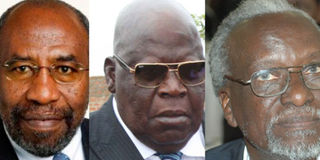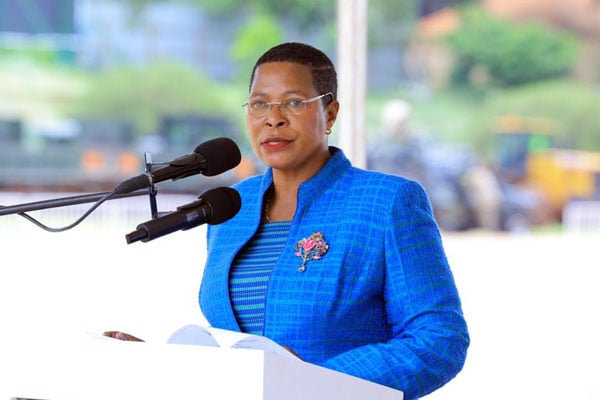Last men standing from 1986 Cabinet

L-R: Dr Rugunda, Moses Ali and Kirunda Kivejinja
President Museveni tapped compatriots that have stood by his side since the 1980s, sacrificed some ministers that have served in Cabinet for the better part of the past 30 years of his rule and also brought in a group of officials that aided the Bush War in varying capacities.
From Museveni’s 1986 Cabinet of 48 ministers – that has since grown to 80 – only four survived the latest elimination.
Prime Minister Ruhakana Rugunda, First Deputy Prime Minister Moses Ali, Second Deputy Prime Minister Kirunda Kivejinja and Justice and Constitutional Affairs minister Kahinda Otafiire are the only surviving members from the 1986 crop.
Gen Ali is West Nile’s only Cabinet minister while Otafiire is one of the only two Cabinet ministers that retained their positions even after losing their parliamentary seats. The other is Energy minister Irene Muloni who lost her Bulambuli Woman MP seat to Sarah Wekomba.
Gen Otafiire, who warned that the NRM faced collapse if it dared expel members like him who insisted on running as Independents after losing in the messy primaries, says the “tenacious” manner in which he handles his work possibly makes him a darling of the President.
“I do my work without fear or favour. I give my opinions without fear of favour and I also take my assignments very seriously like a freedom fighter. I do not back down on any controversies. I am tenacious. There is something about me that offers sacrifice and service. There is something special about me,” Gen Otafiire says.
Maj Gen (rtd) Otafiire resigned from Local Government ministry in the late 1980’s after being involved in an altercation with Ms Jennifer Kutesa, the late wife of Foreign Affairs minister Sam Kutesa.
He bounced back into service as External Security Organisation (ESO) director before regaining his Cabinet slot and as minister of State for Regional Cooperation before serving in other ministries such as Trade and Industry and Lands.
And none of the four have enjoyed an uninterrupted run in Cabinet. After serving as Health minister in 1986, Mr Rugunda served as Internal Affairs minister in the first Cabinet and several other ministries before being appointed Uganda’s lead negotiator with the LRA at the Juba Peace talks.
He was sent to the United Nations as Uganda’s permanent representative and bounced back to serve in different portfolios before taking up the Prime Minister’s position in September 2014.
After Gen Ali’s short stint in the first Cabinet as Tourism minister, he was sent to Luzira prison over allegations of involvement in subversive activities but bounced back into Cabinet.
He lost the East Moyo County seat in 2006 and was subsequently dropped from Cabinet. He bounced back as First Deputy Prime Minister and Leader of Government Business in 2011.
Second Deputy Prime Minister Kivejinja, who first served as minister of Relief and Social Rehabilitation, resigned as minister of Transport and Communications in 1999 as a motion gathered storm in Parliament to censure him for abuse of office.
Kivejinja had allegedly diverted 2,000 litres of fuel from Uganda Railways Corporation to election related activities. After his sacking, Kivejinja worked as Director of External Relations at the Movement Secretariat until 2003 when he bounced back as minister in charge of the Presidency.
Close to NRA struggle
In the new Cabinet that Mr Museveni insists will propel Uganda to middle-income status, Amelia Kyambadde (Trade, Industry and Cooperatives minister designate) has worked with the President for more than three decades, with their relationship dating back to the 1980 days when Museveni served as State minister for Defence in the Military Commission.
Kyambadde was Mr Museveni’s personal secretary then and when the NRA captured power in 1986, she rose through the ranks as secretary, personal secretary, and principal personal secretary before she was appointed principal private secretary in 2005.
After leaving State House in 2011, she ventured into politics, winning the Mawokota North parliamentary seat and was subsequently appointed minister of Trade and Industry, a docket she retained in the in-coming Cabinet.
Asked what makes her stand out of the ground, Ms Kyambadde said she did not want to blow her own trumpet, only saying she is “very committed to work”.
“I can’t sing praises for myself. I am committed and hardworking and try very much to stick to integrity but I do not know whether it has an impact,” Ms Kyambadde said.
Contributors to the Bush War
Gen Jeje Odong (Internal Affairs), Lt Gen Henry Tumukunde (Security), Hajj Abdul Nadduli (Minister without Portfolio) and Tom Butime (Local Government) who join Cabinet are some of those that contributed to the 1980-95 Bush War that ushered Mr Museveni into power.
Gen Odongo was a cadet officer and instructor with the Uganda National Liberation Army (UNLA) based at Kabamba when the NRA attacked on February 6, 1981, launching the Bush War.
Gen Odongo has since talked of how he met rebel fighters like the late Sam Magara and Akanga Byaruhanga as an attack was being planned. He was incarcerated for two years after his bosses became aware of his double-dealings.
Local Government minister designate Tom Butime fought in the NRA and served as deputy minister of Lands and Survey, minister of State for Internal Affairs, minister of Lands, Housing and Physical Planning and minister of Internal Affairs.
He fell out with the regime when he rejected the ministerial position of Junior minister for Karamoja in 2007.
Minister without Portfolio designate Hajj Abdul Nadduli has worked with Museveni from as far back as the Bush War when he joined the NRA forces as a recruitment officer, herbal doctor and political leader during the war.
After the war, Nadduli says he briefly worked as a political commissar in the then NRA 14th Battalion at Bombo before venturing into politics.
The NRM vice chairman for Buganda, Nadduli retired from elective politics after losing the NRM primaries for the Luweero District LC5 seat.
He had served for three terms.
Gender, Labour and Social Affairs minister designate Janat Mukwaya is also part of those that have worked with the President since the Bush War. She was recruited, together with her husband Abbey Mukwaya, by Col Fred Mwesigye and the couple helped with mobilisation efforts in the Luweero triangle, where they are natives.
Fall out
Security minister, Lt Gen Tumukunde, fought in the Bush War but fell out with the establishment after appearing on a radio talk show in 2005 and uttering statements that were adjudged to be prejudicial to discipline and order of the army.
After eight years of restrictions on his life, the Military Court Martial sentenced him to severe reprimand over indiscipline but he found his way back to the favours of the regime and was one of Mr Museveni’s chief mobilisers in the last election.
Mr Museveni also dropped a group of long serving ministers like Daudi Migereko (Lands), Henry Kajura (Public Service), Crispus Kiyonga (Defence), Maria Mutagamba (Tourism), John Nasasira (ICT) and Jim Muhwezi (Information).
All these did not retain their Parliamentary seats and would not be entitled to a vote in Parliament. Mr Nasasira and Mutagamba bowed out of elective politics and did not even participate in the primaries.
But the dropping of veterans was certainly going to raise some discomfort. Fired Information minister Jim Muhwezi has since spoken about being dropped.
“For the people of Rujumbura, definitely they are asking questions because they know what happened; who put up defence for NRM in the strongest Opposition area where the candidate for the strongest Opposition group comes from and neighbouring second one – Col [Kizza] Besigye and [Amama] Mbabazi respectively,” he told NTV in an interview this week.
“So they are asking questions why they didn’t have a share on that political cake. They are asking questions and I have to explain to them that it is the prerogative of the President and they should be happy he gave us time for years in Cabinet.”
Bugahya County MP Pius Wakabi has promised to table a motion when the NRM Caucus convenes regarding the composition of Cabinet, specifically the firing of Second Deputy Prime Minister Henry Kajura.
“Bunyoro region overwhelmingly supported President Museveni and the NRM. It was just in order that Kajura is replaced by a native from the region. Tooro has three Cabinet ministers while Bunyoro has only one. The Caucus should address such issues,” Mr Wakabi said.
Kajura was fired after losing in the NRM primaries and failing to defend the Hoima Municipality seat. Finance minister Matia Kasaija is the only Cabinet minister from Bunyoro.
Some of the ministers in 1986 cabinet
Dr Paul Ssemogerere : Minister of Internal Affairs
Ruhakana Rugunda: Health minister
Prof Shem Masaba : Minister of Veterinary Services and Animal Husbandry
Prof Edward Kakonge : Minister of Local Government
Col Kizza Besigye Deputy minister of Internal Affairs
Cpt Gertrude Njuba : Deputy minister of Relief and Social Rehabilitation
Israel Kayonde : Commerce minister
Robert Kitariko : Agriculture minister
Ssebaana Kizito :Regional Affairs minister
Amanya Mushega Deputy Defence minister
Kahinda Otafiire : Deputy minister for Local Government
Mayanja Nkangi : Minister of Education
Kirunda Kivejinja: Minister of Relief and Social Rehabilitation
John Ntimba : Deputy minister in charge of Higher Education
Dr Crispus Kiyonga: Minister of Cooperatives and Marketing
Victoria Sekitoleko : Deputy minister for Agriculture
Moses Ali : Minister of Tourism
Bidandi Ssali : Minister of Labour
Ibrahim Mukiibi : Foreign Affairs minister
Ben Okello Luwum: Lands and Survey minister
Samson Kisekka: Prime Minister
David Lwanga : Minister of environment
Alex Ofumbi : Minister of Youth, Culture and Sports
James Batwala :Deputy minister for Health
Mawumbe Mukwana : Deputy minister of Information and Broadcasting




